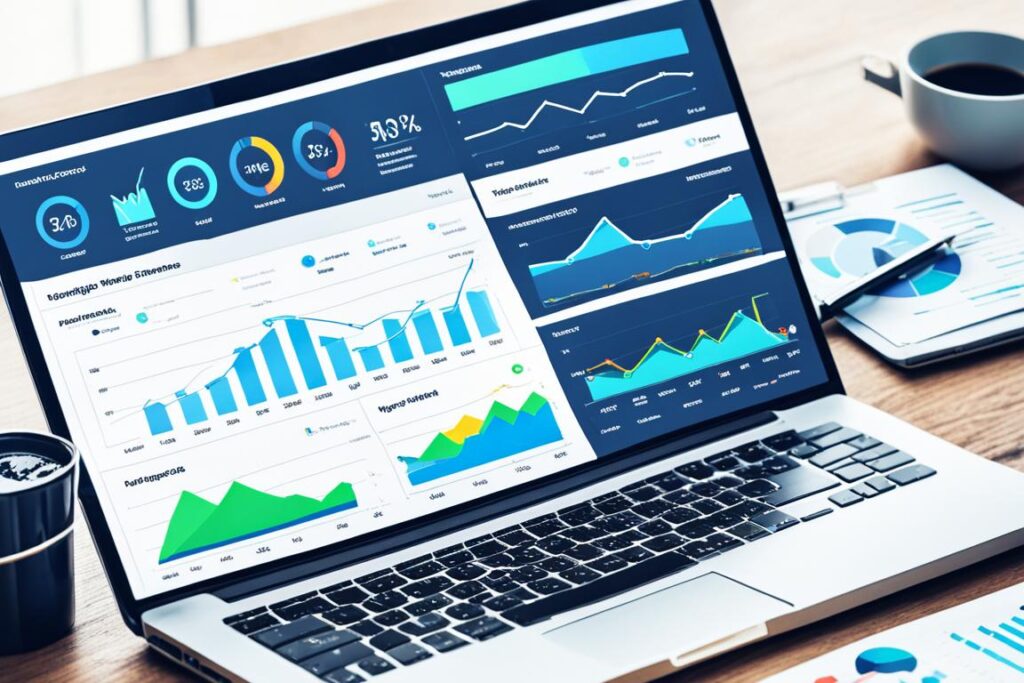Welcome to our guide on how to scale your business with the right web hosting tactics! In the digital era, a powerful online identity is key for growing companies. Your website’s hosting is central to this. Picking a suitable plan and developing it as your business expands is crucial. It significantly impacts your site’s efficiency, user experiences, and your online success.
To make sure your hosting meets your growing business’s needs, you must ask some important questions. In this article, we’ll dive into the significance of website hosting. We’ll show you signs suggesting it’s time to upgrade your plan. We’ll talk about what to look for in a hosting plan that can grow with you. Plus, we’ll share effective strategies for scaling your hosting plan, among other helpful tips.
Key Takeaways:
- Website hosting is vital for business growth and performance.
- Sudden traffic surges, slow page loads, and downtime point to needing a new hosting plan.
- When picking a plan for future needs, look at resources, scalability, uptime, support quality, and cost.
- Great strategies include using a content delivery network, caching, optimizing media, and upgrading hosting.
- Your website’s design also influences how well servers can scale and perform.
Understanding Website Hosting and Its Importance
Website hosting lets you share your website online. You rent space on a server for your files and data. The type of hosting you pick affects how your site works, its speed, and when it’s available.
A website that loads slowly can annoy visitors. This can make them leave quickly, which is bad for your site’s search rankings. If your site is often down, you might miss out on business and harm your name online. But a quick, dependable site makes visitors happy, keeps them around, and helps you sell more.
Getting the right hosting plan is key for a well-running website. It hinges on how much storage, bandwidth, and support you need. Ensure you think about these aspects when choosing a hosting service.
If you choose a plan that fits your site and budget, your visitors will enjoy a smooth visit. This will help your business grow and meet your aims online.
So, the key to a successful website is choosing the best plan and provider.
Let’s dive deeper into the signs that indicate the need to scale your hosting plan and explore the factors to consider when choosing a hosting plan for scaling.
Before we start, imagine how important website hosting is for your online image:
Now, let’s discuss the signs that your website might need better hosting. And we’ll look at what to check when finding a plan that lets your site grow.
Signs That Your Website Needs to Scale Its Hosting Plan
Expanding your website’s hosting plan is key as your online presence grows. It’s vital to spot signs early that your current hosting setup can’t keep up. This way, you can fix issues fast. This ensures your website runs well and keeps users happy.
Increased Traffic: A big spike in website visitors shows your hosting plan needs growth. More visitors may cause your site to load slowly or perform poorly.
Slow Page Load Times: If users have to wait for your page to load, they might leave. This often means your hosting can’t handle the number of requests it gets during busy times.
Frequent Downtime: Lots of site downtime suggests your hosting plan is not keeping up. This can be due to more traffic than it can handle, or not enough server power. It harms trust with your visitors.
Limited Storage or Bandwidth: Growing sites need more space and data handling ability. If your hosting plan limits these, your site won’t grow well or handle bigger audiences.
Seeing these warning signs lets you act quickly. Converting to a more powerful hosting plan makes sure your site can handle more users, load fast, and meets customer needs.
Comparison of Hosting Plans
| Hosting Plan | Resources | Scalability | Uptime & Reliability | Price |
|---|---|---|---|---|
| Basic | Limited | Limited | 99% uptime, occasional downtime | Low |
| Advanced | Ample | Scalable resources | 99.9% uptime, minimal downtime | Moderate |
| Premium | Generous | Highly scalable resources | 99.99% uptime, minimal downtime | High |
Factors to Consider When Choosing a Hosting Plan for Scaling
Choosing the right hosting plan is key when making your website bigger. You need to think about a few things to make sure it’s a smooth process. Here are the main points to look at:
1. Hosting Plan Resources
First, you need to check what resources the hosting plan offers. Make sure it has enough storage, bandwidth, and processing power to handle more visitors. Not enough resources can make your site slow and frustrate users.
2. Scalability
Scalability is very important. You should pick a plan that can grow with your needs. Choose a host that lets you easily add or remove resources. This way, your site stays smooth even during busy times.
3. Uptime and Reliability
Your site being up and reliable is a big deal. Make sure the host you pick doesn’t have a lot of downtime. This will help keep visitors happy and avoid losing business.
4. Support
Having good support is crucial, especially when growing your site. Make sure the host provides help 24/7 through chat, email, or phone. A helpful support team can fix problems fast, keeping your site running smoothly.
5. Price
The price is also something to think about. You want to get what you pay for but also need it to fit your budget. Compare different hosts to get a good deal on the features you need.
Considering these points helps you find a hosting plan that’s right for your website. Next, we’ll look at strategies to smartly scale your hosting plan.

| Factors to Consider | Key Points |
|---|---|
| Hosting Plan Resources | Adequate storage, bandwidth, CPU, and RAM. |
| Scalability | Ability to expand or decrease resources as needed. |
| Uptime and Reliability | High uptime percentages and reliable infrastructure. |
| Support | 24/7 support through multiple channels. |
| Price | Balance between cost and features. |
Smart Strategies for Scaling Your Website Hosting Plan
Scaling up your website hosting can be a game-changer with smart moves. By using the right steps, your site can perform better and welcome more visitors. Let’s look at some top strategies to up your hosting game:
1. Content Delivery Network (CDN)
A Content Delivery Network (CDN) is a bunch of servers placed worldwide. It speeds up your site and handles spikes in traffic. This network serves your content from nearby servers, cutting down on waiting time. As a result, your site runs smoothly even with lots of visitors.
2. Caching
Caching helps your site load faster and eases the pressure on your server. It stores common files like HTML and CSS, so they’re ready to go. That means visitors get what they need quicker, your site performs better, and your server can deal with a busier crowd.
3. Image and Video Optimization
Images and videos make sites rich but can slow them down too. Tweaking these media files by compressing them keeps quality high but lessens their size. This means quicker load times and lower use of bandwidth. Using the latest formats for images and videos, like WebP and MP4, takes this further, making your site even faster.
4. Upgrading Your Hosting Plan
When your site grows, it’s natural to upgrade your hosting plan. More resources like storage and processing power keep things running smoothly. Choosing a plan that allows for growth means you can keep up with your site’s success easily.
By focusing on these strategies, you make your hosting plan work harder for you. This leads to a great experience for users at all times, even when the traffic is heavy.
Importance of Website Design in Scaling Hosting
Website design is key in making hosting work better and making your website perform optimally. A good design makes users happy and your site handle more visitors easily. But a bad design uses too many server resources, leads to slow loading, and limits growth.
For a scalable design, focus on these key areas:
- Use a lightweight theme. This choice lowers server burden and makes pages load faster. Less unneeded code means your site runs more smoothly and grows better.
- Optimize your code by cutting unused parts and shrinking file sizes for CSS and JavaScript. Fast-loading code means less strain on servers, and your site can handle more traffic smoothly.
- Design for devices of all sizes. Every site today must flex to fit mobile screens, giving everyone a good experience. It helps your site grow without hitches.
“A well-designed website that optimizes resource usage and improves scalability is the foundation of a successful hosting strategy.”
– John Smith, Web Design Expert
By adopting these tips, your site can deal with more visitors, work faster, and keep users happy. A well-thought-out design is crucial for a scalable hosting plan and meeting your online business’s needs as they grow.
Website Design Best Practices for Scaling Hosting
To refine your site’s design for better scalability, keep these guidelines in mind:
- Shrink image and video sizes by compressing them. This makes them load quicker without reducing their quality. It boosts your site’s scalability and efficiency.
- Be sparing with plugins and scripts to avoid lag and unnecessary resource use. Review and tweak them regularly to make sure they help, not hurt, your site.
- Employ caching to lower the load. This technique stores information that gets used a lot, easing the stress on your server. Both browser and server caching can make your site more scalable.
| Website Design Best Practices | Benefits |
|---|---|
| Using a lightweight theme | – Reduces server load – Improves website speed |
| Optimizing code | – Minimizes file sizes – Enhances website performance |
| Implementing responsive design | – Supports optimal functionality on all devices – Improves user experience |
| Optimizing images and videos | – Reduces file sizes without compromising quality – Enhances scalability |
| Minimizing plugins and scripts | – Improves website performance – Optimizes resource usage |
| Implementing caching | – Reduces server load – Improves website speed |
Following these strategies ensures that your design supports your hosting’s scalability. It helps your website welcome more visitors while providing a top-notch user experience. Remember, scaling is about optimizing every part of your website’s design to grow efficiently.
Tools and Resources for Monitoring Website Traffic and Scaling Hosting
It’s important to track your website’s traffic and performance to adjust your hosting plan. With tools like Google Analytics, you see detailed insights. This helps you make smart choices about your hosting resources as your website grows.

Google Analytics gives you a lot of details about your site’s performance. You can learn about your visitors, where they come from, and more. Using this information, you can spot trends, find areas to make better, and enhance your website for users.
Tracking your site’s traffic with Google Analytics is key. This way you can see how your site is doing and check if your changes work. It lets you make decisions based on real data when adjusting your hosting to fit your growing traffic needs.
“Google Analytics provides valuable data on website traffic and user behavior, allowing you to monitor your website’s performance and make informed decisions when it comes to scaling your hosting plan.”
Alongside Google Analytics, many tools can help you monitor your site traffic and adjust your hosting plan. These tools give you current data and insights you need to grow your website.
Here are some tools and resources to consider for monitoring website traffic and scaling hosting:
- AWStats: This one is free and open-source. It offers in-depth site traffic analysis, such as unique visitors and keyword use.
- Piwik: It’s a platform you host yourself for analytics. It’s like Google Analytics and tracks your site’s performance.
- MATomo: This open-source tool shows off your site’s data, including what visitors do and how they find your site.
- SEMrush: Ideal for SEO, it looks at your website’s traffic, does keyword research, and looks at your competition to make your site better.
These tools and resources offer insights into your site’s traffic. They help you watch how well your site does and make smart decisions to grow your hosting plan. By using these tools for regular monitoring, you can better manage your hosting resources as your website grows.
Common Mistakes to Avoid When Scaling Website Hosting
Scaling your website hosting is crucial for dealing with more visitors and keeping your site fast. But some errors can slow you down. By knowing these pitfalls and steering clear, you make scaling smoother and hit your goals.
Underestimating Traffic
Don’t guess low on how many guests your site will get. A wrong guess might cause crashes and lost money. Look closely at your traffic now and what might come. Pick a hosting plan ready for today and tomorrow’s visitors. This way, your site stays quick and open for anyone.
Over-Optimizing
Too much tweaking for speed can break your site’s fun and use. For a great website, focus on how visitors see and use it. Make it fast but also easy to move around and buy things.
Neglecting Security
Forgetting about security can lead to big problems. Not being safe could mean hackers get in. Go with a host that keeps your site and data safe. They should do things like use SSL, make backups, and check for viruses. When you start safe, you keep your site and trust up.
“By understanding the common mistakes to avoid when scaling website hosting, businesses can enhance their chances of seamless growth and uninterrupted performance.”
Getting past these slip-ups can really boost your scaling effort. Carefully guessing your site’s future, focusing on how it feels for users, and being secure are key. With the right moves, your site will stay smooth, even with more visitors.
| Scaling Mistake | Impact | Solution |
|---|---|---|
| Underestimating Traffic | Unexpected downtime, lost revenue | Choose a hosting plan that can handle current and future traffic levels |
| Over-Optimizing | Reduced functionality, poor user experience | Focus on user experience and prioritize essential elements |
| Neglecting Security | Data breaches, damage to reputation | Select a hosting provider with robust security features |
Understanding and avoiding mistakes makes hosting growth smoother. Take time to pick the right host, care for security, and make your site user-friendly. With a solid plan, your site can welcome more guests and help your business grow.
Hiring a Professional Web Developer for Scaling Website Hosting and Design
Scaling website hosting and design is tough, especially for non-tech folks. It’s best to hire a professional web developer to boost your site’s scalability and performance. They have the skills and experience to manage the various tasks needed.
A web developer tackles key aspects like server setup and smooth operation when traffic is high. They make your website scalable by adjusting the design for more visitors and data. Their strategies help your site grow without hiccups.
Having a pro handle the complexities of scaling lets you focus on your business. When you hand over this work, you know your site is in good hands.
A web developer can also help optimize your site. They make sure it runs smoothly, giving your visitors a great experience. They work on things like page speed, responsive design, and how your site functions.
Choosing a skilled web developer is smart for your site’s hosting and design needs. They can deal with more traffic, boost your site’s performance, and help your online venture succeed.
Conclusion
Scale up your online business with a strong web hosting plan. Dedicated hosting provides many perks for your business’s growth and performance. It offers faster website speed, better security, customizations, and more resources when needed.
For the best results with dedicated hosting, first, figure out what your business needs. Understand how much traffic you get, how much storage is needed, and your technical needs. Then, choose a reliable hosting service that focuses on dedicated hosting and gives you good support.
To boost your website’s performance, you need to make some tweaks. Improve the design, make images and videos load faster, use caching, and consider a content delivery network (CDN). Keep an eye on your website’s traffic and performance. This helps you see where you can grow, making the needed changes along the way.
Remember, growing your online business is a continuous effort. Keep checking how your site is doing, and watch how users interact with it. Adjust your hosting plan as needed. With dedicated hosting and careful watching of your site, you’ll be ready to conquer the online market and reach more success.
Top web hosting providers are HostGator, DreamHost, InMotion Hosting, IONOS, Hostwinds



